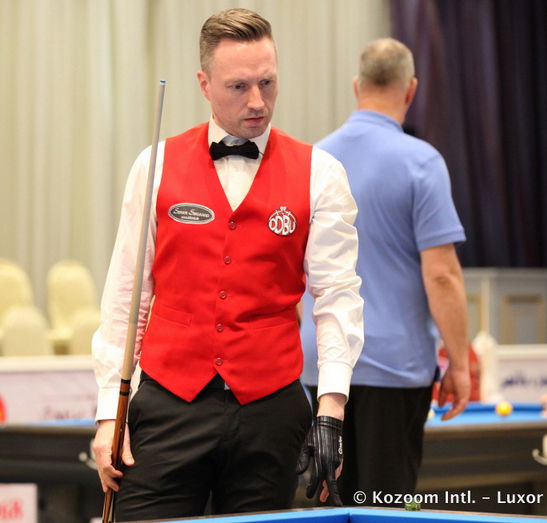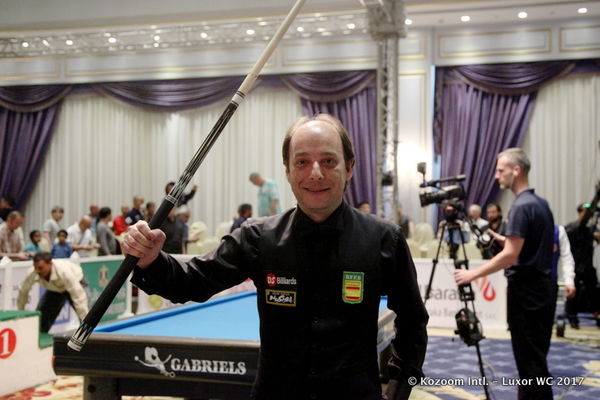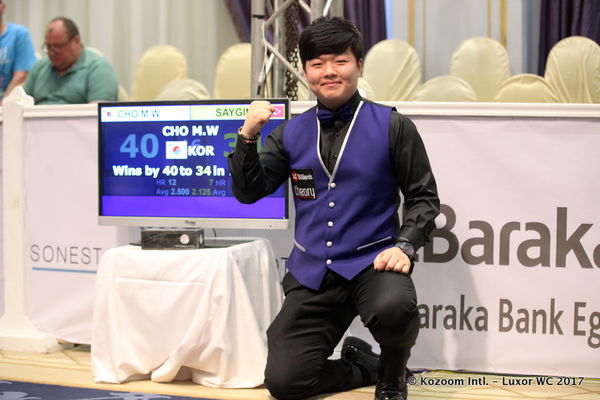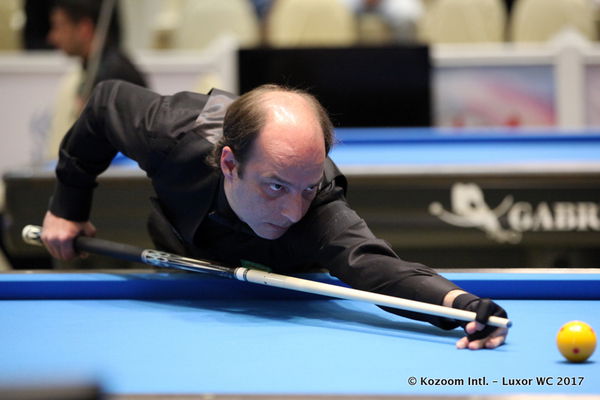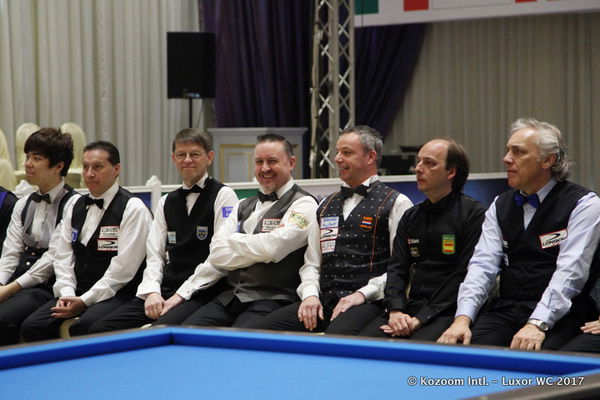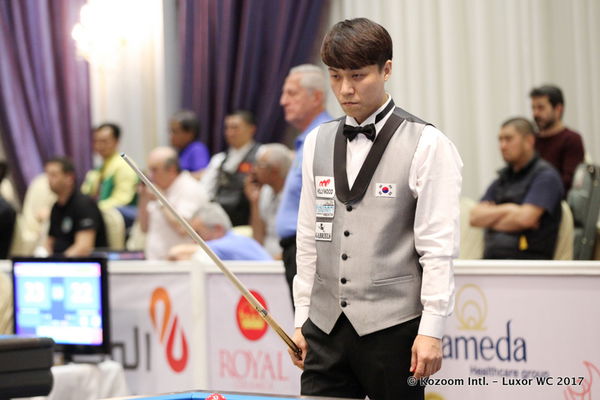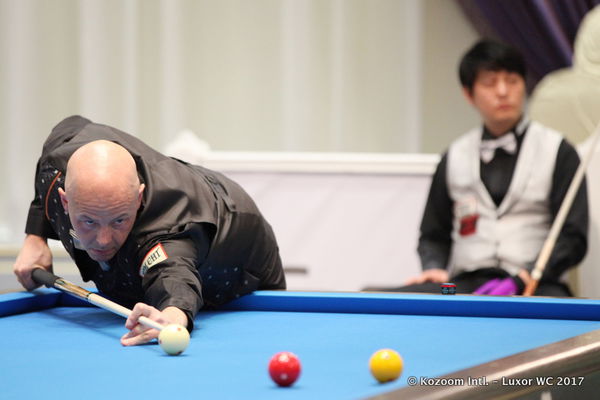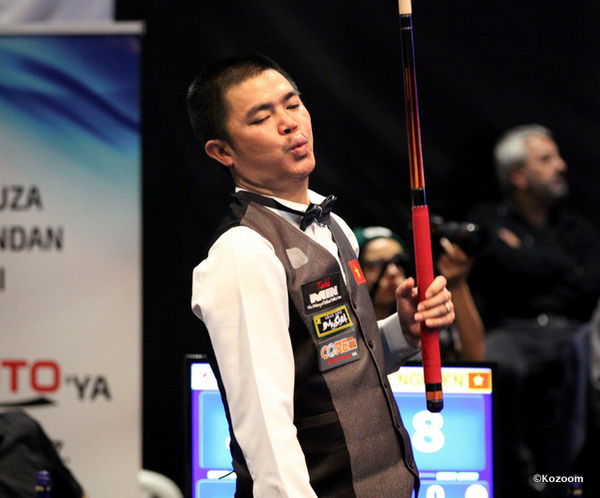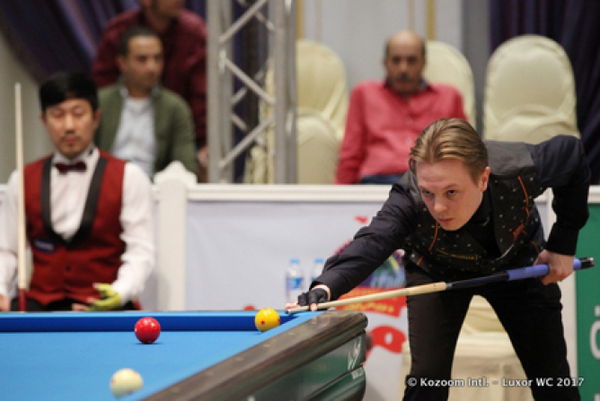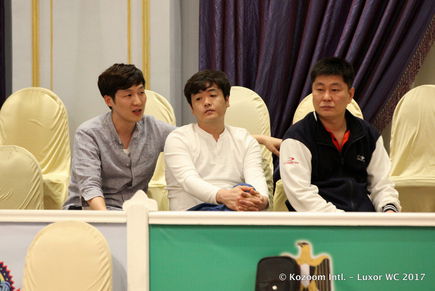LUXOR - He was once considered one of the great talents of Danish billiards, a player with a great future. Jacob Haack Sörensen is his name, and he belongs to the generation of Dion Nelin, Brian Zola Hansen and Brian Knudsen. The now 45-year old player, born in Odense, now living in Copenhagen, left the spotlights for a number of years, after he and Dion Nelin had won the world team title in Viersen in 1995. For twelve years he was absent from the big stage, but now he's back, playing in the Luxor World Cup.
They were 18 and 22 years old, Dion and Jacob, in that world title year. Young, upcoming players with flair and panache. It was a kickstart to a fine career, and Nelin certainly had his share of successes. He was runner-up in the WC in his home country, and won the European junior title. Jacob Haack Sörensen never made the real breakthrough, in spite of his podium finishes at the EC of 2002 in Izmir, behind Caudron and Carlsen, and his bronze at the WC of 2004 in Rotterdam, behind Jaspers and Kasidokostas.
The blonde, fashionably coiffed Dane agrees to do an interview in Luxor, and to tell the story of his career. Jacob Haack Sörensen, logistics manager and distributor in a food & supplements company, studied economics at the university, was married and is father two 11-year old twin boys.
Kozoom/Frits Bakker: Why did you return to the international stage, where does your new ambition come from?
Jacob Haack Sörensen: I felt the fire burning again, the ambition to play in World Cups and other major events. Don't think I haven't missed it! I have followed billiards always, and thanks to Kozoom I could see all the great matches. But for a variety of reasons, I only played in Denmark, and a few matches here and there in Germany and the Netherlands, as a sub. My return has two reasons: as I said, after some ups and downs I have the craving back. That has a lot to do with Michael Mikkelsen, a strong player in the technical games I became friends with. We practice together a lot, I admire his knowledge and technique, and he has brought my enthusiasm back. He gives me the inspiration I needed.
Secondly: the Danish federation has started a project aimed at the WC of 2019 (in Randers, Denmark), to enable Danish players to climb the international ranking ladder. That attracted me, obviously. For now, there are five of us, for two years: Tonny Carlsen, Lars Dunch, Allan Schröder, Thomas Andersen and myself. Not Dion Nelin, he did not have the ambition to join. The federation has found sponsorship to cover the cost of travelling to World Cups, and they organize practice sessions. I will play three World Cups this year: Luxor, Porto and La Baule.
Kozoom/FB: How do you look back at your career's beautiful start? And when did it take a different turn?
JHS: I started playing when I was fifteen, with a school buddy. First we played Danish pins, a discipline with pins on a match table with pockets, a game that is only played in Denmark. A few years later I switched to carom, because it has much more substance. I soon felt I was talented and could get stronger. Hans Laursen, a well-known Danish player, became my teacher. I won the Danish title, surprisingly, and wanted to conquer the world, to play World Cups. This was the generation of Dani Sánchez, Roland Forthomme, Michael Nilsson, Nikos Polychronopoulos.
I was the first Danish junior champion to be sent to the EC for juniors. Dani Sánchez, who beat me in the quarters, became the champion there. That was a wonderful period. The World Cups came, and the world title with Dion Nelin was a sensation in my country. Denmark thought billiards was a sport for senior citizens. And now the two of us, 18 and 22 years old, were world champions. The papers could not get enough of it. In the following years, in the World Cups, I did not win titles but I often made it to the quarterfinals. Around the year 2000, I was steady in the top-10 of the world ranking.
Then my life changed. I moved to Copenhagen, got a job, got married in 2003 and we had the two boys. I also went back to college, which left little time for billiards. I still finished third at the WC in Rotterdam in 2004, but a year later in Lugo, I played my last WC. From then on, I have not played much, I did not have the ambition or the time for practice and travel.''
Kozoom/FB: What happened since, in your life and in the sport?
JHS: I focused on my work, mostly. I did not have the time to travel. There were also physical problems: I had to have a hernia operation, and I was out for four months. But that was in 2002, when I was still building my career. I got married in 2003, but we split up later. The boys live close by, so I see them all the time. I still played some billiards, in the Danish, Dutch and German leagues, but not every week. The WC in Viersen, in 2016, with Brian Zola Hansen was my comeback. And now we have the World Cups, which I am looking forward to a lot.
Kozoom/FB: What has changed in 3-cushion in these years, tactically, technically?
JHS: A lot...As I said, I kept following it on Kozoom and it was fascinating. The game plan has changed dramatically in the past ten years. Most of the top players have adopted a more attacking style. The game is now 90 % offensive, which has given the averages a boost. Of course it is still imperative to defend, but the game is more attractive now, speed is a major weapon, the game is fresh and more entertaining. More speed does not mean you depend on luck for position. Bert van Manen recently wrote a fine column about that, prompted by the Bursa final between Caudron and Jaspers. In the ten years I was gone, the level has gone up in leaps.
Kozoom/FB: What about you? Have you changed as well?
JHS: My life is quite different from what it was a few years ago. I am happy, and better aware of who I really am. I am much stronger mentally. I was depressed for a while, six months even. That was a terrible journey. But the sun shines on me these days, I enjoy life and the sport I've always loved.
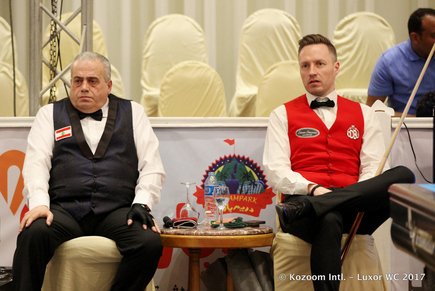
Jacob Haack, before the start of his first match in Luxor
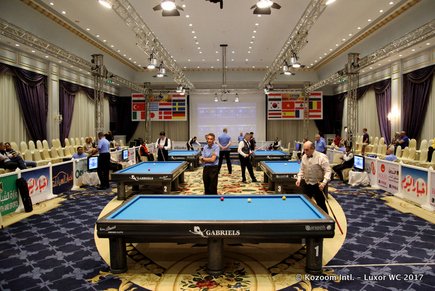
The arena in the Augusta St. George hotel
